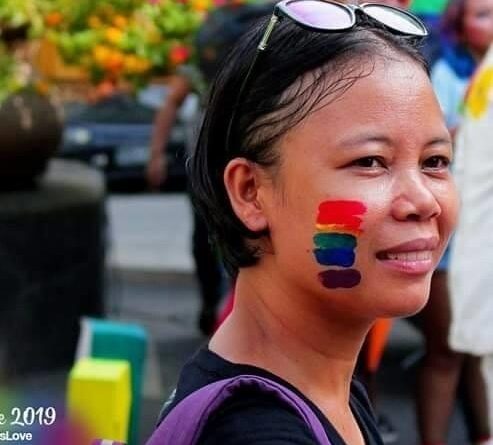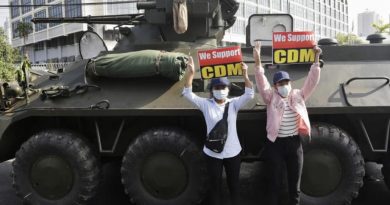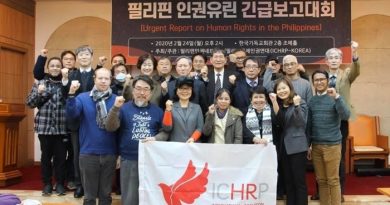An Interview with Zara Alvarez
President Rodrigo Duterte, who took office as the 16th president of the Philippines in 2016, has brutally suppressed the human rights of innocent citizens under the pretext of a war on crime/drugs, and the recent COVID 19 situation has added to the worst in the Philippines.
In an interview with Zara Alvarez, a Filipino human rights activist, we hear about the human rights situation in the Philippines.
Ms. Zara Alvarez was arrested in October 2012 on the charge of killing Mr. Polanzo, a captain of the Philippine army. Philippine authorities have arrested and charged a total of 52 people, including Zara, for allegedly being senior members of the rebel group, the New People’s Army in the Philippines. But 22 of them, including Zara, were indicted without clear evidence and witnesses, and she was released on bail in July 2014. In March, Zara was finally acquitted of the Polanzo’s murder case. It turned out to be a fake case. Zara is an educator and human rights activist. At the time of her arrest, Zara was working for the North Negros Human Rights Union.
1. What is the key human rights issue in the Philippines?
It is too difficult to point out just one key human rights issue in the Philippines.
The war on drugs, counter insurgency program, and criminality that President Duterte began in 2016 led to extra judicial killings and human rights abuses, particularly among the poor social classes. This has added another dimension to existing conflict. The financial and political strengthening of military and police units, particularly the de facto immunity granted to them, is also partly responsible for the continuation of violence in many parts of the country. The Human rights in the Philippines is exposed to the severe challenges.
The militarization of the Philippines’ Civilian Bureaucracy was never before highlighted under a post-Marcos administration until now. Reports shows that Duterte appointed at least 73 officials who are all former officers of the Armed Forces of the Philippines (AFP) and the Philippine National Police (PNP) holding the highest positions to key civilian government offices and Government-Owned-and-Controlled Corporations.
There is a growing vilification campaign directly conducted by the state forces against Human Rights Workers. Duterte has explicitly contributed to the threats and harassment being initiated against rights defenders. Numerous times in his public and official speeches, he himself, redtagged and vilified some progressive organizations and known critics. In February 2019, Parlade’s team traipsed to Bosnia, Switzerland and Belgium. They urged the European Union and the Belgian Foreign Ministry to stop financial support for some 30 non-governmental organizations in the Philippines especially Rural Missionaries of the Philippines (RMP), IBON Foundation, KARAPATAN, and Alcadev. Parlade’s team claimed the funds were being used to fuel “terrorist acts”. Their trip to Europe failed.
When Duterte and his minions started focusing their tirades against lawyers and other human rights defenders, they declared an open season against members of various rights groups by wrongfully tagging them as a “legal front” of the Communist Party of the Philippines and the New People’s Army. This is akin to explicitly identifying them as targets, thus making human rights work even more dangerous in the country.
Under the current administration, the country has seen an alarming increase in the number of activists and government critics with trumped up charges and subjected to illegal arrests and imprisonment.
The current regime has weaponized the legal system to attack political opponents. This began in early 2017 when opposition Senator Leila De Lima was imprisoned on non-bailable drug-related charges, in September 2018, the government arrested Senator Antonio Trillanes IV, a vocal critic of Duterte. Allegedly, the pardon granted to him by the past administration was invalid. Chief Justice Lourdes Sereno was removed from office when Solicitor General Calida filed a quo warranto petition against her and the Supreme Justices dominated by Duterte took the unprecedented and arguably unconstitutional step of removing its own chief justice. The latest is a sedition case filed against VP Leni Robredo, De La Salle dean Manuel Diokno, Former Solicitor general Florin Hilbay, Former House Deputy Speaker Erin Tanada, Theodore Te, and church people; Atty. Neri Colmenares of the National Union of People’s Lawyers and vocal critic of Duterte administration faces kidnapping charges; and the shutdown of ABS-CBN through the combined treacherous efforts of President Duterte’s minions in Congress, the Office of the Solicitor general and the National Telecommunication Company.
2. Is COVID-19 aggravating the HR situation, if so in what aspects?
Yes, the Duterte administration is using the Republic Act 11469: Bayanihan to Heal as One Act in the massive human rights violations in the Philipines. This Act gave President Duterte the additional powers to handle the outbreak of COVID-19 for 3 months (March 25-June 24, 2020). Several times, under his additional powers, he threatened to declare Martial Law. The state forces then lash out under the Bayanihan Act and the Enhanced Community Quarantine (ECQ) guidelines as if it is the “supreme law”.
Quarantine is a health measure to contain the spread of an epidemic or diseases. But Duterte’s administration’s brand of quarantine is characterized by restrictive and militarist measures that curtail the liberties and control the movement of the people: people were locked in their homes, mass gatherings were prohibited, curfew was imposed especially to minors and senior citizens who are not allowed to go out of their homes, and checkpoints were set up. The Philippine National Police and the Armed Forces of the Philippines were deployed to “effectively implement the ECQ”.
Every day, we are bombarded with videos of police harassment. Barangay officials and state forces are attacking women, children, senior citizens, people with disabilities and ordinary citizens. They shame and humiliate, use brute force, maul and kill those allegedly violating the community quarantine protocols and the Bayanihan We Heal as One Act.
In May 7, 2020 interview of GMA 7 with General Guillermo Eleazar, he said that PNP has accosted more than 150, 000 individuals who violated the ECQ protocols. It is ironic that the number of people accosted by the police surpassed the 126,713 number of people who were tested for COVID-19 reported by DOH on May 5, 2020.
Some of the highlighted cases of human rights violations during the ECQ are as follows:
1) Twenty one community members in Quezon City who were asking for food relief and assistance were dispersed and arrested.
2) Members of people’s organizations and NGOs who are doing relief and feeding program activities to communities affected by ECQ were investigated, arrested and detained.
3) An army veteran, Cpl. Winston Ragos suffering from mental health problems was killed by a policeman for allegedly violating the rules.
4) Jory Porquia, Bayan Muna Iloilo coordinator who led a feeding program for affected families during the ECQ was threatened and was eventually shot to death on April 30, 2020.
5) During the ECQ, peasant killings continue: Marlon Maldos, Nora Apique and John Farochilin.
The rights of the health care front liners working for the health and protection of the people especially during the COVID-19 crisis were grossly violated. Mostly, it’s the private sectors that provide the personal protective equipment to them. Their duty hours were prolonged and often lasted up to 12-14 hours. As of May 5, 2020, 1,772 health workers were infected with COVID-19 comprising a 19% total of the 9,485 total cases. Thirty-four front line health workers, mostly doctors and nurses have died from the disease.
3. What are the key remedies to the present human rights situation?
In my own point of view, it may not be the key remedies but some remedies to address the human rights issues in the Philippines:
a. Stop the labelling of members and leaders of progressive people’s organizations and patriots as “terrorists” both in National and International Forums. Stop the threats, intimidations and harassment of HRDs.
b. In the Philippines, the Human Security Act of 2007 should be repealed and all legislative, administrative, executive and judicial acts that violate Human Rights (Memorandum Order 32, Executive Order 70, the Provincial Order No.5). The human security Act of 2007 or the Anti-terrorism Law as counter-terror measures contain broad, vague, and malicious provisions, with far-reaching implications on the people’s exercise of their civil and political rights.
Under Memorandum Order 32, the military, police and the Department of Justice (DOJ) have been directed to “intensify local and transnational intelligence operations against individuals or groups suspected of, or responsible for, conspiring to commit acts of lawless violence in the Philippines. In MO 32, Duterte “has also authorized intensified intelligence operations against persons or groups behind the acts of lawless violence as well as their prompt investigation and prosecution.” In MO 32, Duterte ordered law enforcement to effectively address, immediately prosecute and hold accountable acts of terrorism and human rights violations by agents of the State. This order was declared by President Duterte last November 22, 2018 for the provinces of Samar, Negros Occidental and Negros Oriental, and the Bicol Region.
Executive Order No. 70: this was signed on December 4, 2018 by the President, it is institutionalizing a national approach in attaining inclusive and sustainable peace, creating a National Task Force to end local communist armed conflict, and directing the adoption of a national peace framework.
c. End the counter-insurgency program Oplan Kapanatagan which directs and funds State Security forces to threaten, harass, and arbitrarily/illegally arrest individuals tagged as “enemies” of the State.
d. Immediately abolish the Inter Agency Committee on Legal Action (IACLA), a body created by AFP and PNP which further legitimizes and systematizes the political persecution and illegal arrest and detention of rights defenders and activists.
e. Continue the Peace talks between the GRP and the NDFP
f. Adhere to and respect the UDHR, ICCPR, UN Declaration on HRDs and all major Human Rights Instruments to which it is a party and signatory.




